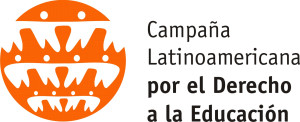What do we do?
Through advocacy actions, interinstitutional coordination, strategic communication, research and social mobilization, CLADE seeks to promote the achievement of education from a human rights-based perspective, that meets the standards of availability, accessibility, acceptability and adaptability, acknowledging diversity, promoting citizenship and the realization of human rights, as well as eliminating all forms of discrimination.
In line with the Inter-American Democratic Charter, the campaign considers that strong democratic contexts are fundamental for the realization of human rights and to lead decent lives. In this sense, the campaign not only advocates to assert the human right to education and to achieve an education that guarantees rights, but also to strengthen democracies, where social participation is recognized as a right in itself and full active citizenship can be achieved.
CLADE’s quadrennial Strategic Plan is guided by key goals: to strengthen public education systems, to ensure inclusive education for all, to guarantee the right to education throughout life, to ensure conditions for the realization of the human right to education, to make the democratic political culture take firm root in countries of Latin America and the Caribbean and to strengthen collective action for human rights.
Some of our main action areas are:













